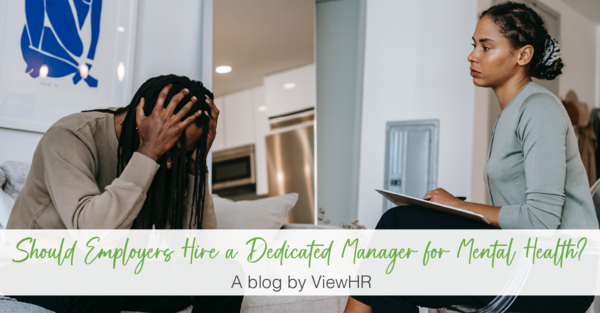Drop off your CV
We serve the global HR community through our offices located in Delhi, Hong Kong, London, New York, São Paulo and Singapore and have placed HR leaders in over 30 countries.
Written by our partners at ViewHR According to the Mental Health Foundation, in the UK 70 mi...

Written by our partners at ViewHR According to the Mental Health Foundation, in the UK 70 million days of work are lost each year due to mental health problems, costing employers approximately £2.4 billion[1]. However, supporting the mental health of your employees potentially has other benefits aside from reducing sickness absence; it can also contribute towards improving morale, retention and your employer brand, as well as help to fulfil your obligations as an employer for employee wellbeing. There are a number of actions employers can take to support the mental health of their employees.
These include: Training employees across the business to be Mental Health First Aiders (MHFAs), enabling them to learn about mental health and how to identify, understand and help a colleague who may be experiencing a mental health issue[2]; Other learning and development opportunities, such as training for line managers on recognising and managing stress, and for employees on topics such as resilience; The introduction of an employee assistance programme (EAP); Access to Occupational Health; The CIPD 2021 Health and wellbeing at work survey report also recommend risk assessments and stress audits for identifying and managing employee stress[3]: A written policy can help to formalise the employers plans and provide information and reassurance to employees. In some (often larger) organisations, the introduction of a role with dedicated responsibility for employee mental health has been a growing trend recently.
But is it right for your organisation? There are some factors for employers to consider. The benefits of such an appointment can include: Creating and implementing a mental health wellbeing strategy; Ensuring that employee mental health becomes and remains a focus area, including as part of strategic planning (e.g. for projects and change); Working with line managers and functional areas such as HR and health and safety to develop policy; Implementing training for managers and employees; Staying up-to-date with emerging wellbeing topics, such as menopause awareness; Implementing measures and raising awareness of services available, such as an Employee Assistance Programme (EAP); Gathering regular feedback from employees about mental health; Providing a point of contact for queries and concerns relating to mental health. Of course, such an appointment will have costs associated.
However, by measuring other key HR data such as absence levels and employee turnover (another thing that a dedicated manager can take charge of!), the return on investment can be identified and understood over time. Ultimately, much like health and safety, whilst somebody may have a leading role, employee mental health is something where everybody within an organisation has a role to play. As such, whether or not an employer decides to introduce a dedicated mental health manager, the culture and measures led by the organisation's senior leadership, and the awareness and actions towards colleagues of each employee and manager, all have an important role to play.
This blog has been written by ViewHR. The ViewHR team regularly support employers with mental health matters in the workplace, both in relation to individual employee concerns and wider strategic projects. If you are an employer and would like support in this area, please contact a member of the ViewHR team today for an initial discussion: hr@viewhr.co.uk | +44(0)1425 205390 | viewhr.co.uk. ViewHR are UK based and provide flexible HR support and guidance combined with employment law consultancy. [1] https://www.mentalhealth.org.uk/our-work/mental-health-workplace [2] https://mhfaengland.org/online-mental-health-courses/ [3] https://www.cipd.co.uk/knowledge/culture/well-being/stress-factsheet#8227